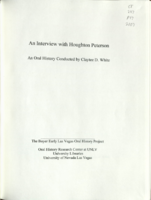Search the Special Collections and Archives Portal
Search Results

Transcript of interview with Houghton Hoot Peterson by Claytee White, May 20, 2010
Date
Archival Collection
Description
Houghton Hoot Peterson played trombone in his high school band in northern Minnesota where he grew up. That same instrument would lead him to be a member of the highly regarded Air Force jazz band called Airmen of Note after enlistment. Then during a short tour at Nellis Air Force base, Hoot decided that the Las Vegas entertainment scene might have career opportunities for him. He moved to Las Vegas in 1962, an era of celebrity performers and tourists who enjoyed the crowds and nightlife. Hoot's point of view was as a musician in the band, most often a Strip relief band. But he also has tales of famous musicians and late night jam sessions. Hoot's career spanned 20 years. Eventually the Las Vegas scene for live musicians began to change. When times got tough for Hoot, he worked as a carpenter and at a music store. In this interview he discusses his fascinating past and offers advice for today's musicians.
Text

Transcript of interview with Otto Merida by Claytee White, May 18, 2017
Date
Archival Collection
Description
When looking back on his legacy in the Latinx community of Las Vegas, Otto Merida (1945 - ) takes great pride in being a Latin Chamber of Commerce [LCC] co-founder with Arturo Cambeiro. With the LCC, they forged a powerful economic entity that continues to provide the local Latino community with social and political influence. Growing up during the 1950s in Havana, Otto Merida fondly remembers his childhood despite living under the dictatorship of Fulgencio Batista. There were the murmuring sounds of explosions from afar on the way to baseball games, but also the warm Sunday family meals of Cuban soup with fideos. In this interview, he talks about the rising communist powers inspired by revolutionary Fidel Castro and the events that led his family to place him in the Peter Pan Program in 1961. The Peter Pan Program sent unaccompanied Cuban children to the United States to avoid potential instruction by Castro’s government. Merida still holds on to his mother’s final request upon leaving Cuba-“I want you to remember the address where we live and the phone number: Josefina 68-entre primera y segunda-La Víbora, Havana con el teléfono X4304.” As a part of the Peter Pan Program, Merida experienced a nomadic childhood living in barracks in Miami and a three-story home in Wilmington, DE. The only connection he had to his family were a series of letters he exchanged with his mother, until they reunited years later in Miami. For Merida, life on 79th Street and Biscayne Boulevard in Miami was defined by the values of his family and other Cubans and African Americans in his neighborhood. v Merida earned his bachelor’s degree in Political Science from the University of Florida. He credits his sister-in-law with a pivotal role in his decision to pursue a higher education. His engagement in politics continued through his involvement with the Cuban Circle, the first Hispanic community to be involved with politics in Las Vegas. He describes the migration of Cubans to the casino scene of Las Vegas and the presence of Cubans in the community. His work with the Cuban Circle inspired him to develop a political presence for Hispanics in the community. While travelling across the United States before settling in Las Vegas, Merida made many significant relationships while working with associations such as the Fitchburg Chamber of Commerce and Volunteers in Service to America [VISTA]. Living in Las Vegas, Otto Merida worked as an educator and community organizer. In the late 1970s, Merida and Arturo Cambeiro collaborated to create the Latin Chamber of Commerce of Las Vegas. For Merida, the Chamber consistently goes above and beyond the vision he and Cambeiro had created when they first opened their doors. From the creation of the Latino Youth Leadership Program at UNLV to their work alongside political figures such as Senator Catherine Cortez-Masto, Merida is extremely proud of the various accomplishments of the Chamber. Now as President Emeritus, Otto Merida continues to dedicate himself to the Chamber as a volunteer and serves as one of the many Latinx Voices of Southern Nevada that have shaped the greater Las Vegas community.
Text

Transcript of interview with Frank Paul Silver by Barbara Tabach, August 29, 2017
Date
Archival Collection
Description
In 1973, Dr. Frank P. Silver ( 1934 - ) escaped the bitter weather of Philadelphia with his choice to relocate his OB/GYN medical practice to the small community of Boulder City. In his reflections of the move, Dr. Silver recalls his wife Elaine had little input in the initial move. However, with four children to manage, she soon made a home for the Silvers. Before the move, Dr. Silver was a lifelong resident of the Philadelphia area. He graduated from La Salle University, Jefferson University Medical School and did his residency at Nazareth Hospital – all in Philadelphia. In Southern Nevada he enjoyed the weather and the excitement of building his medical practice. He mentions occasional challenges of being Jewish in the 1970s in the area. He also talks about being a shareholder in the Crystal Palace, a Laughlin casino.
Text

David Ober interview, October 11, 2017: transcript
Date
Archival Collection
Description
Tucson, Arizona, native David Ober moved to Las Vegas twice. He arrived reluctantly the first time in 1978 with his parents as a high-school student, when his father, Hal Ober, came to Las Vegas to begin building and marketing the U.S. Home (now Lennar) brand. While the elder Ober soon left U.S. Home to open his own home-building business, R.A. Homes, his youngest child left Las Vegas shortly after his high school graduation to return to his native Tucson, follow in the footsteps of his siblings, and attend the University of Arizona. After graduating from the University of Arizona David Ober opened his own mortgage company and began building a life in Phoenix. In the late 1980s he agreed to take a large pay cut, return to Las Vegas, and learn his father's business from the ground up. At the time, Hal Ober was developing his award-winning, master-planned community, Desert Shores. David Ober, the youngest of the five children of Hal and D'Vorre (Dee) Ober, agreed to participate in the
Text

Transcript of interview with Kenny Epstein by Barbara Tabach, May 1, 2015
Date
Archival Collection
Description
On a pleasant spring evening at sundown in April 2017, a Pop-Up Shabbat draws a crowd of Jews to the Jackie Gaughan Parkway at the El Cortez Hotel & Casino. Proudly, and quietly, watching from the sideline is Kenny Epstein, owner of the El Cortez. He seeks no recognition, but is enjoying the gathering for Sabbath services and the music that will fill the air. Kenny Epstein is also a classic enthusiast of Las Vegas history. The nostalgia is evident as one walks through the casino and reinforced by the stories of a man who has experienced the city’s growth since moving here in 1959 at the age of 18. The timeline of Kenny’s teen years begins with his bar mitzvah in Chicago and a story of prizefighter Rocky Marciano giving a brief toast. When he was 15, his parents, Ike and Adele Epstein, took the family to visit Las Vegas. About three years later, his father became an executive at the Stardust. Kenny’s own imprint on Las Vegas history was just beginning. In this brief interview, he mentions an illustrious list of mentors and recalls many historic moments from the history of the Las Vegas Strip. All of which led to his ownership of The El Cortez—advertised as the longest continuously operating hotel/casino.
Text

Transcript of interview with Stan Irwin by Cork Proctor, October 24, 2003
Date
Archival Collection
Description
Stan Irwin shares details of his background, family, and early show business experiences. His life story spans many decades and includes attending NYU, doing stand-up comedy, flying during WWII, working at Club Bingo in Las Vegas, and building up the entertainment at the Sahara Hotel. Mr. Irwin comments on many aspects of the Las Vegas entertainment scene. He recalls many headliners that he worked with and shares anecdotes about several. The Beatles, Johnny Carson, Dinah Washington, Billie Holliday, Lena Home, and Pearl Bailey are just a few of the many outstanding performers that he brought to Las Vegas. Stan offers comments on racism in Las Vegas thirty and forty years ago, and gives his opinions on the Mob, Howard Hughes, prostitution, and dress codes in the fifties and sixties, among other things. He recalls how Las Vegas looked in the early days, mentions a cardiovascular health project for children that he's involved with today, and gives a little insight into staying fit at eighty-plus.
Text

Transcript of interview with Dr. Catherine Bellver by Caryll Batt Dziedziak, November 13, 1995
Date
Archival Collection
Description
Dr. Catherine Bellver is a woman with tenacity. How else could one describe her drive to create the Women's Studies Program spanning fifteen years? As a faculty member in the Department of Foreign Languages, Dr. Bellver first joined the Women's Studies steering committee in 1979. In the following decade, the committee oversaw the formation of the Women's Studies Program, including: procuring administrative and faculty support, creating bylaws and course criteria, critiquing proposed cross-listed courses, and selecting course offerings. During that period she also worked with a volunteer group to create and staff the first Women's Center on campus. In the early Nineties, she played an instrumental role in the presentation of four public colloquia that addressed key issues pertaining to women. Dr. Bellver acted as interim director of the Women's Studies Program while overseeing the search for a permanent director. She continued to remain involved with the Women's Studies program, serving as faculty member on several committees. She has also worked in the Women's Caucus on the regional and national levels of the Modem Languages Association Dr. Bellver is currently Distinguished Professor of Spanish in the Department of Foreign Languages at the University of Nevada, Las Vegas. Her work has appeared in journals such as Anales de la Literature Espanola Contemporanea, Hispanic Review, Hispanofila, Insula, Journal of Interdisciplinary Studies, Monographic Review/Revista Monografica, Revista de Estudios Modernos, Revista Hispanica Moderna, Romance Notes and Romanic Review. Dr. Bellver's participation in the creation of the Women's Studies Program illustrates how critical institutional and social progress can result from the commitment of a determined group of individuals. Her decades of involvement in creating an academic arena for the study of women and gender issues underscores the significance of women's contributions to the history of Las Vegas. In addition to the history of the Women's Studies Program at the University of Nevada Las Vegas this interview contains information regarding the creation of the first Women's Center on campus.
Text

James L. Hogan interview, October 12, 1975: transcript
Date
Archival Collection
Description
From the Ralph Roske Oral History Project on Early Las Vegas collection OH-00871. On October 12, 1975, collector Mary B. Hogan interviewed her father, farmer James L. Hogan (born April 6th, 1909 in Winton Place, Ohio) at the Hogan family home, in Las Vegas, Nevada. The interview covers the life of a Las Vegas old-timer. Mr. Hogan discusses moving to Las Vegas, early Las Vegas, Boulder Dam, and the Stewart Ranch. Colonel T. W. Miller and Vic Whittlesea are also mentioned.
Text

Transcript of interview with Elinor Horden by Valerie Fujii, February 13, 1930
Date
Archival Collection
Description
On February 13th, 1980, collector Valerie Fujii interviewed dancer, Elinor Horden, (born May 21st, 1930 in Ohio) at the University of Nevada, Las Vegas. This interview covers local entertainment in the 1950s and the social and environmental changes that have occurred in Las Vegas, Nevada.
Text

